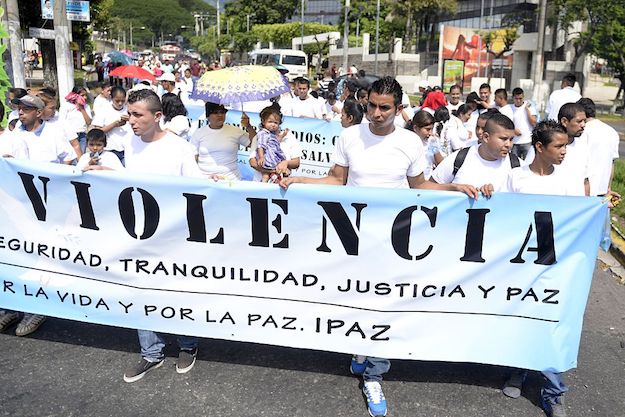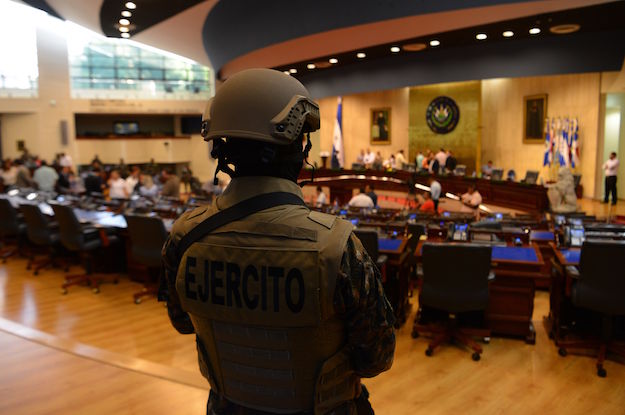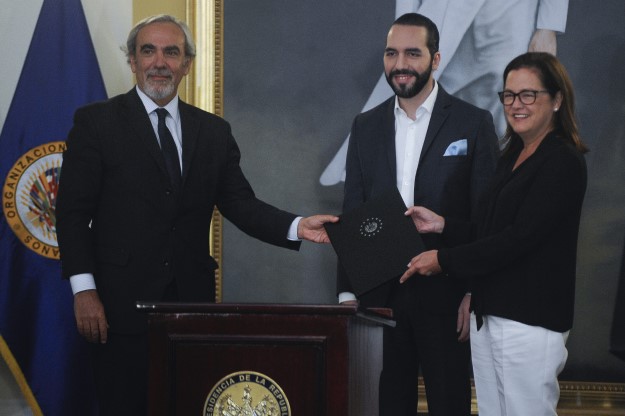In his successful bid for El Salvador’s presidency, Nayib Bukele styled himself as an outsider, founding a political party under the mantle of “New Ideas.” After his election in 2019, he promised a “new era” for El Salvador.
But the images shared by the young president on April 26 – of hundreds of half-naked imprisoned gang members, forced nearly on top of each other in defiance of the social distancing protocols Bukele has mandated for the rest of the country – suggested a new way of doing things may have to wait in El Salvador.
“What Bukele is ordering is really a continuation of measures we’ve seen before,” Dr. Sonja Wolf, a professor at Mexico’ Center for Research and Teaching in Economics and the author of Mano Dura: The Politics of Gang Control in El Salvador, told AQ. “It is shocking and alarming to see this, but it’s not the first time that the governments have acted harshly against gang members or taken drastic measures in the prisons.”
“What Bukele is ordering is really a continuation of measures we’ve seen before.”
Dr. Sonja Wolf
After homicides spiked around the country following weeks of calm, Bukele ordered that prisoners from rival gangs be housed together in crowded cells. Over the weekend, there were 60 murders, a stark reversal of a positive trend during Bukele’s administration thus far. With questionable authority to do so, the president responded by authorizing security forces to use “lethal force” against gang members – something his predecessor did in 2015.
The repressive measures reflect the kind of heavy-handed security policies Bukele distanced himself from as a candidate, and they fit what observers describe as a pattern of anti-democratic behavior dating back to his election. The crackdown on gangs came less than two weeks after Bukele dismissed multiple Supreme Court rulings that said that security forces couldn’t lawfully arrest people for breaking quarantine. Since he mandated a nationwide lockdown on March 21, hundreds of violators have been arrested and sent to “containment centers” where healthy individuals have been reportedly held with COVID-19 positive detainees in poor conditions. In the first month of the lockdown, El Salvador’s human rights ombudsmen received 778 complaints.
But when the Supreme Court ruled that Bukele didn’t have the constitutional authority to issue an executive decree for the arrest of lockdown violators, Bukele did not listen. On Twitter he called for more detentions, threatening his constituents with a month in containment, acknowledging his country’s lack of tests could mean their stay could be indefinite.
“Bukele acts as if the COVID-19 pandemic justifies removing the Supreme Court’s critical role as a check on rights abuses by the executive branch,” responded Jose Miguel Vivanco, the Americas director at Human Rights Watch.
“In his world, he decides who is guilty or innocent,” Vivanco later tweeted.
The strongman image projected by Bukele in recent months stands in contrast with the picture of the young, energizing change agent many in the international community saw him as before he took office. In 2017, a glowing TIME profile commended Bukele for “battling criminality with creativity” and fighting “violence with social work” as San Salvador’s mayor. When he was elected president, the U.S. ambassador to El Salvador expressed optimism in Bukele’s “pragmatic way of looking at matters.”
For many, that image changed in February when Bukele sent armed soldiers into Congress to demand they fund his security plan. The images evoked darker days from the past.
“February was a turning point,” Michael Camilleri, the director of the Peter D. Bell Rule of Law Program at the Inter-American Dialogue, told AQ.
To defend his actions, Bukele has been able to point to high approval ratings among constituents – one poll claimed that 97% of Salvadorans approved of his pandemic response – and, at least until this weekend, improving security indicators. He’s harshly criticized his opponents on social media, accusing, for example, the Supreme Court judges who ruled against his quarantine arrests of “deciding the deaths of thousands of Salvadorans.”
“Bukele’s style of governing is bullying,” Carlos Dada, the founder and director of the news website El Faro, told AQ.
“Of course he’s against institutions because he doesn’t control institutions,” Dada said, noting his lack of a majority in Congress.
After sending soldiers into Congress in February, Bukele insisted in a Washington Post op-ed that he respects the separation of powers and instead blamed crime in the country on the “polarizing policies” of the FMLN and ARENA, the two parties that held a tight grip on power before Bukele’s election. But the president’s critics say it’s his divisive rhetoric and actions that are polarizing the country.
“Debates are handled in a really binary way. There is no dialogue,” Johnny Wright Sol, a former congressman and the president of the centrist political party Nuestro Tiempo, told AQ. “You’re either with him or against him.”
“There is no dialogue. You’re either with him or against him.”
Johnny Wright Sol
“The irony of it all is that now you have the FMLM and ARENA working together to defend democracy,” Wright told AQ. “What they couldn’t do in 30 years – sit down at the table and talk – this guy is obligating them to do that.”








